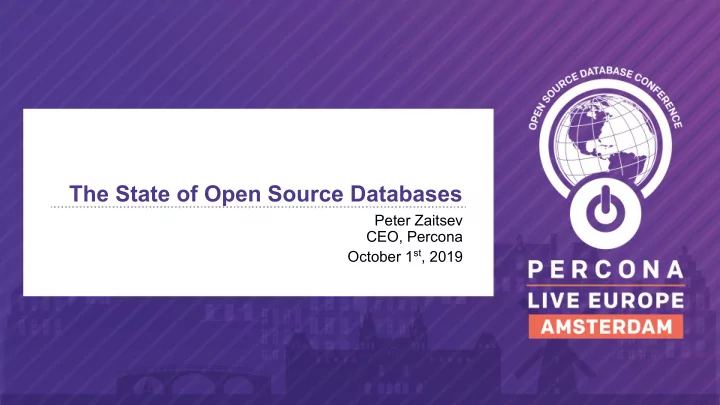

The State of Open Source Databases Peter Zaitsev CEO, Percona October 1 st , 2019
Open Source Software Amazing times for Open Source Software!
Commercial Success Fantastic Success of Open Source Based Businesses!
RedHat Acquired by IBM Image Source: https://techcrunch.com/story/ibm-acquires-red-hat/
Select Open Source Powered Companies MongoDB - Pivotal - Elastic - $6.3B $6.6B Acquired $2.7B GitHub - MuleSoft - Cloudera - Acquired for Acquired for $2.4B $7.5B $6.5B
Open Source Software Traction Source: https://twitter.com/asynchio/status/1103408136860327936
Major Public Clouds Majority of their Revenue Even on Microsoft Azure is powered by Open Linux Surpassed Source Software Windows
Big Money Creates Big Tension How are Tens of Billions of Value Created by Open Source Software are going to be divided ?
Open Source and Distributed Software Permissive License Copyleft License •BSD, MIT, Apache 2.0 •GPLv2, GPLv3 •Allows Derived •Intent to force Software to be contribution back Proprietary
Never was Perfect… Hardware as a way to capture value without giving back Restricted Access to Binaries, Build System
Age of the Cloud Software is not distributed, provided as a service Copyleft Licenses such as GPL behave as Permissive License AGPL suppose to fix this but is not considered strong enough
The Problem Cloud Companies capture lion share of Open Source derived Revenue Without legally required to give back
Cloud Open Source Contribution All Major Cloud Companies Contribute To Open Source Their Contribution is not Always Code This Contribution does not go to all the projects they monetize
AWS’s Large Contribution
Business Contribution to Open Source Businesses always contribute to Open Source for a business reason, Open Source Companies and Cloud Vendors alike
Great Open Source Debate Do we need Different Or do we need to define a Class of Open Source new class of Proprietary Licenses which prevents Software, with access to competition from Cloud source code and few use Vendors restrictions
Open Core Summit
How Open Source Software is Built Mostly Single Company Many Developers Development •Open-Source for Users •Open-Source for Users and Contributors •A lot of Capital Required •Less Capital Requirements
MongoDB vs PostgreSQL MongoDB CEO – Dev Itticheria “ “MongoDB was built by MongoDB. There was no prior art. We didn’t open source it for help; we open sourced it as a freemium strategy”” Source: https://www.cbronline.com/interview/mongodb-ceo-interview
Modern Open Source is Heavily Funded MongoDB - RedisLabs - Elastic - Confluent - $311M $147M $162M $206M CockroachDB InfluxDB - Neo4J - - $109M $120M $160M Source: https://www.crunchbase.com/
Unicorns Changing from Open Source Licenses MongoDB changes Software License to SSPL (Server Side Public License) Elastic, Confluent, and Redis Labs releasing some components with Source Available License
Are you ready to share the pie ? Do we want to create a bigger pie, or have it all to ourselves?
Contribution and Competition Best way to invite contribution is by inviting competition
Venture Capital Approach VCs Prefer to fund creating monopolies
What Project Users Prefer ? The Opposite of Monopoly ! I have not seen a customer who enjoys being a hostage!
Simplicity and Convenience … But they also want Simplicity and Convenience and ready to compromise on vendor lock-in to achieve it
Competition Competition Creates Better Choices Competition ensures more balanced relationships between vendor and customer Competition makes for a harder business
Tale of Two Companies
Beyond the Licensing
Open Source is a Strategic Priority 69% of respondents say Open Source is of strategic importance to Enterprise infrastructure 68% of respondents increased Open Source Software usage over the last year 59% of respondents will increase usage further in the coming year Source: https://www.redhat.com/en/enterprise-open-source-report/2019
Top Benefits of Open Source Software 33% - Lower 29% - Access to Cost of Latest Ownership Innovations 29% - Better Security Source: https://www.redhat.com/en/enterprise-open-source-report/2019
Open Source Databases
Multi-Cloud/Hybrid Strategy ? 86% Source: https://www.zdnet.com/article/multicloud-everything-you-need-to-know-about-the-biggest-trend-in-cloud-computing/
Reasons for Multi-Cloud/Hybrid Strategy Vendor Lock-in Shadow IT Performance Compliance Resilience
Top Databases Source: https://db-engines.com/en/ranking
Developers love Open Source Databases Most Used databases per Stack Overflow Survey (2019) Source: https://insights.stackoverflow.com/survey/2019
Reasons to Adopt Open Source Databases The top three reasons to adopt Open Source databases:
Fears of Open Source Technologies The main fears when adopting Open Source database technology:
Self Support 64% of respondents rely on self-support when ● running Open Source database technology Only 36% use external support ●
License Preferences Source Available licenses Permissive Licenses are are considered closer to the most preferred by proprietary licenses than respondents (2.5x more) Open Source
Relational Databases are Still Rocking it 97% of respondents use Open Source Operational Relational Databases ● 48% of respondents use Search Engines ● 37% of respondents use Document Databases ●
DBaaS is Winning Hearts and Minds •Convenience •Agility •Operational simplicity
DBaaS is Enemy of no Lock-In •DBaaS tends to be sufficiently different among cloud providers
Percona’s Vision
Leading Companies Will Use Multiple Database Technologies Use Multi-Cloud and Hybrid Environments Embrace Open Source to avoid Vendor Lock-in
Open Source Solutions Will •Enhance Their Convenience and Simplicity to reduce the gap with Cloud Vendors DBaaS Offerings
Percona Will •Invest in Providing Software and Solution to bring this future faster
Cloud Native Modern Way to Build Applications Gives new Tools for Automation and Orchestration which were never available before Kubernetes as leading Cloud Native Platform
Thank You
Recommend
More recommend